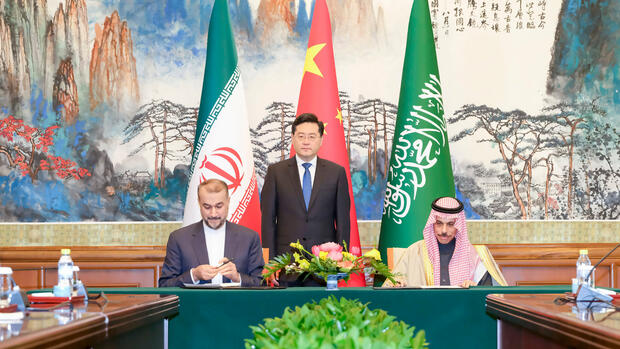Istanbul, Tel Aviv After the mediation between Saudi Arabia and Iran, China wants to further expand its diplomatic influence. Foreign Minister Qin Gang introduced his country as a facilitator for peace talks in phone calls this week with Israeli Foreign Minister Eli Cohen and Palestinian Foreign Minister Riyad al-Maliki.
Saudi Arabia and Iran have set a good example for resolving differences through dialogue, he argued. But in Israel, the initiative is not met with much interest. China is currently sensing an opportunity to expand its influence in the Middle East and to penetrate the vacuum left in the region by the US. “It’s never too late to do the right thing,” said a spokesman for China’s foreign ministry.
Among other things, Beijing has an interest in a stable energy supply from the region. In addition, Russia is currently so busy with Ukraine that China has a free diplomatic path in the region. According to the Chinese Foreign Ministry, Israel’s foreign minister said his country was willing to ease tensions.
However, a press release from the Israeli Foreign Ministry does not even mention Beijing’s offer to support Israeli-Palestinian peace talks. It was about maintaining peace on the Temple Mount.
In addition, Minister Cohen Qin “reported the danger that (Israel) sees in Iran’s nuclear program.” Many countries in the region would take a similar view, “including countries that have diplomatic ties with Iran.”
The two-state solution mentioned by Qin is not an issue for Jerusalem. Israel’s government is dominated by hardliners who want nothing to do with a state of Palestine. Violence increased again in April with rocket attacks.
China as a neutral mediator
The reaction in Ramallah, where Qin’s initiative was expressly welcomed, was quite different. Palestinian Foreign Minister Riyad al-Maliki also thanked China for its support in international organizations and suggested a series of joint projects to strengthen the “strategic partnership”.
At the same time, al-Maliki reaffirmed China’s right to territorial integrity. Ramallah supported the “one China principle” on the Taiwan issue, according to the Palestinian foreign minister. However, it would also be tricky for Israel to ignore China’s political ambitions in the Middle East.
Trade with the People’s Republic has grown from $1 billion in 2001 to $12 billion. A large part of Israel’s technology exports go to China.
According to a Western diplomat in Jerusalem, who asked not to be named, China is increasingly interested in acting as a neutral mediator in global conflicts. “In contrast to the USA or Europe, China can appear in the Orient without historical ballast.” Beijing is interested in stability in the Middle East so as not to jeopardize its energy supply.
>> Read here: China Seeks New World Order – A Commentary
The fact that French President Emmanuel Macron urged President Xi Jinping during his recent visit to China to “bring everyone back to the negotiating table” underscores the growing perception that Beijing’s involvement in conflict mediation is necessary to find “meaningful solutions”, evaluates a French businessman in Tel Aviv.
Beijing’s attempts at mediation have often failed in the past – for example between the Taliban and the Afghan government or in South Asia between Bangladesh and Myanmar.
But Beijing is also concerned with a positive global image through the mediation efforts. The spokeswoman for the Chinese Foreign Ministry, Mao Ning, said after the mediation between Riyadh and Tehran that the People’s Republic wanted to contribute to the security and stability of the Gulf region by mediating. Beijing is “a force for reconciliation, peace and harmony in the Middle East”.
China has reconciled two arch-enemies
In March, Saudi Arabia and Iran reached an agreement in China to restore diplomatic ties that were cut in 2016. It was a welcome opportunity for the People’s Republic to present itself as a diplomatic player in the Middle East.
Macron urged Xi to “bring everyone back to the negotiating table” during his recent China visit.
(Photo: IMAGO/Xinhua)
Beijing had been brokering a fresh start behind the scenes for months. For the first time in more than seven years, there are to be direct flights between the two countries again, and the embassies are also to be reopened.
In addition, both states want to make it easier for citizens of the other country to issue entry visas, including for Iranian pilgrimages to Mecca. Both countries also reaffirmed their already declared willingness to resume trade relations.
The rapprochement between Saudi Arabia and Iran could also have an impact on the Syrian conflict. The two regional powers had positioned themselves behind different groups and thus fueled the conflict even more. Syria’s ruler Bashar al-Assad is currently being received by more and more heads of state in the region.
In recent years, the Assad government has tightened its control over much of Syria. Neighboring countries initiated the first rapprochement steps. The development accelerated after the devastating earthquake in Turkey and Syria at the beginning of February.
More: How China reconciled two arch-enemies
